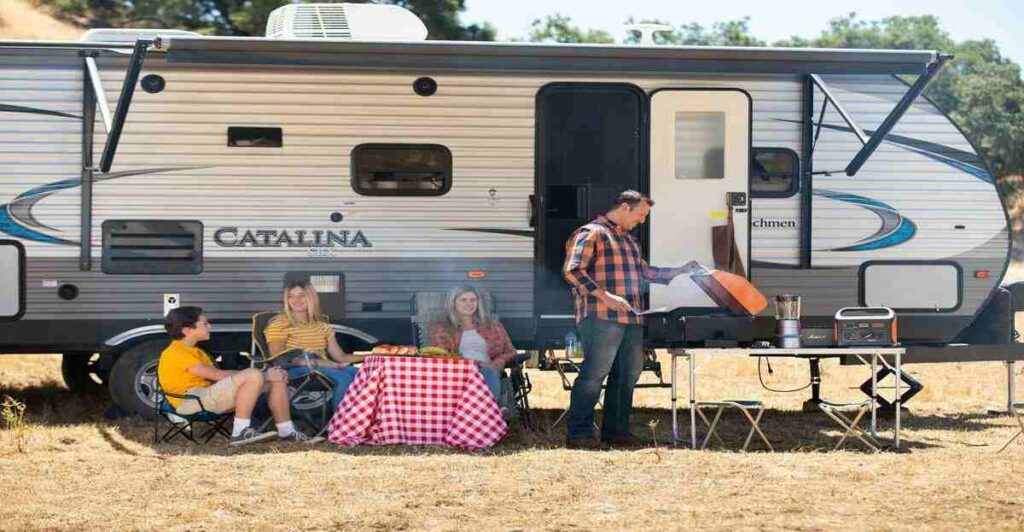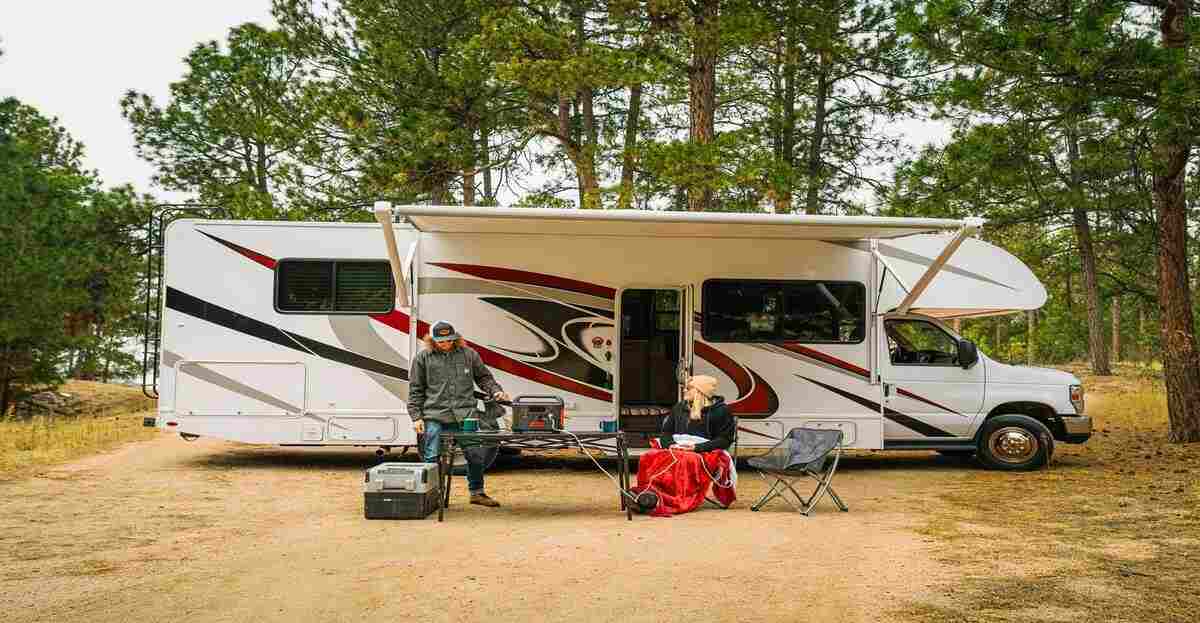Generators are a critical part of the operation of an RV. They give you the power you need to keep your appliances and other electronics running while not connected to shore power. But generators aren’t perfect and they do have limitations.
One of such limitations is how long they can safely run without needing to be cooled down or refilled with oil. This article will explore that question along with some other considerations for generator use in RVs.
For How Long Can an RV Generator Safely Run?
An RV generator can run for 24 hours if it is properly maintained. It may take longer to do so, depending on the load and the fuel tank capacity.
If you’re looking to run your generator for 5 hours at a time, then you’ll need to refill its fuel tank twice before getting back up and running again.
For 3 hours of use? You’ll probably want to refuel once during this time period—but don’t overfill your generator’s tank. A full tank can damage it because there won’t be enough room for all of the gas inside (which could lead to leaking).
You should be able to get 2 hours of use out of your RV generator before needing another fill-up of gas or propane if everything else is working properly (i.e., no issues with cooling systems). The same rules apply as above, if filling up too much causes damage due to lack of room inside then less will fit without causing any sorta problems later down the road when trying to start up again next time around.
Is It OK To Run RV Generator All Night?
A generator is more than capable of running all night, but it does come with some downsides.
- You’ll run out of fuel. It’s important to keep an eye on how much gas you’re using and make sure that the generator has enough fuel to run for as long as you need it to. If your tank is close to empty, consider using a smaller electric appliance or two instead so that there’s enough fuel left over for emergencies (like when the power goes out) in case you can’t get back home right away.
- The generator will overheat if it’s running long hours at full capacity without any rest time between loads of electricity demand. This risk can be mitigated by keeping an eye on how much power your appliances are drawing and being careful not to overload them or leave them running too long—the same way that anyone would use their home’s electrical system responsibly.
- The generator may make noise while operating because it needs to be oiled moving parts like fans and belts. These noises are normal sounds from this process happening inside the unit itself rather than outside noises coming from other sources such as other equipment running nearby on site. Keep this in mind if you plan on sleeping nearby while using one during nighttime hours because hearing these sounds might keep others awake due
How Long Can You Run A Generator Without Stopping?
The answer is: it depends. It depends on how much power you’re using and if that generator has enough fuel to provide you with the energy you need.
If your RV only needs to run for a few hours at a time, then it will probably be okay for the generator to run for longer. However, if your RV requires constant power throughout the day, then running out of gas or oil wouldn’t be ideal in any situation.
In general, RV owners should make sure they have enough gas or oil stored inside their vehicle so that they can keep their generators up and running safely throughout most situations – especially during emergencies where there might not be electricity available elsewhere
How Long Can You Run Onan Generator?
According to the manufacturer, you can run an Onan generator for up to 12 hours at a time. However, the engine will reach its fuel-injection temperature and shut down after this amount of time. You should never try to force it to run longer than that because it could cause serious damage.
If you’re planning on going camping or boating for more than 12 hours, your best bet is likely going to be with a marine-rated gasoline generator instead of an Onan unit since they’re made with higher-grade materials that are better suited for long-term use.
If you need something portable and quiet but don’t want one of these larger units or if those aren’t available in your area, then it’s worth looking into purchasing an inverter generator like this one from WEN which has enough power output capacity but can still fit inside most RVs without being too loud or obtrusive.
Can You Sleep While a Generator Is Running?
Yes, you can sleep in your RV while it’s running on a generator. However, the constant noise of the generator can be a problem for some people. If you find yourself bothered by the sound of your generator, there are ways to reduce this annoyance:
- Use an air conditioner to drown out some of the noise.
- Purchase a muffler if your generator has an exhaust pipe that leads outside. This device will help soften and muffle some of the loud droning noises coming from your engine.
- Get creative with insulation if you want to keep things quieter around campgrounds or other areas with lots of potential noise pollution like airports or construction sites, which often have their own generators. For example, consider placing foam insulation between walls and ceiling panels so that no one can hear them knocking against each other when things start getting loud inside; this could prevent anyone from feeling too uncomfortable while sleeping at night.
- Lastly but not least: consider purchasing a sound dampener which we’ve found improves our sleeping experience significantly since it absorbs unwanted sounds produced by either ourselves or others nearby like those pesky aeroplanes overhead.
Can You Run Your RV Generator While Driving?
No, you should not run your generator while driving. The best practice is to use the generator when your RV is parked and turned off on the level ground.
If you need to operate a generator while driving, do so for short periods of time (30 seconds or less and only when safe).
When Should I Use My RV Generator?
There are several situations in which you might want to use your generator:
- If the power goes out, it’s a good idea to start your generator as soon as possible. This will prevent damage to your appliances and electronics. It also gives you time to prepare for the outage by turning off any unnecessary appliances so that they won’t drain battery power during an outage.
- When boondocking, you’ll probably want to run your generator every few days or so, depending on how much power you’re using (or how much it rains). A typical family who doesn’t have any solar panels installed will likely need two hours of operation per day just to keep their batteries charged while they’re travelling down the road. The more batteries in series with one another, the more electricity they can store – but this also increases the voltage drop across each individual battery cell/battery element/battery module.
How Long Will An RV Generator Run On Propane?

As with most things, the answer is “it depends.” In this case, it’s a matter of how many amps you’re pulling and how much propane your generator holds. If you’re running a small portable unit that only draws about 1 amp at 120 volts and has a 5-gallon tank (like the DuroMax XP5500E), it can last for hours.
However, if you’ve got an RV or boat that uses 20 gallons of gasoline to fill its tanks, it can only run for about four hours before needing to be refuelled.
For smaller generators like those used in RVs or boats, there isn’t much difference between running on propane versus gasoline since both use similar technology for fuel delivery and ignition systems.
It is worth noting that big rigs often need recharging after six hours due to their size and power consumption. This means that while larger generators might be able to run longer than six hours on full tanks of either type of fuel type without issue (depending on conditions), smaller ones may not be able to handle such demands without overheating themselves out from under us.
Conclusion
It is important to know how long you can run your generator safely and efficiently. There are several factors that affect how long your generator will run, including the size and type of generator, and the type of fuel used (propane or diesel).
Other factors are how often it’s been used in the past year, weather conditions like temperature and humidity levels as well as other environmental factors such as dust particles that may be present in outdoor environments where generators are commonly used.

